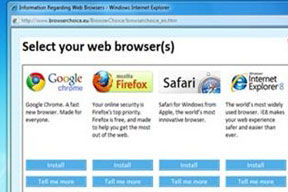Microsoft accused of favouring 'IE clones'
A web designer has complained to the European Commission that four of the seven secondary browser choices are no more than rebadged IE clones.

Microsoft has been accused of trying to protect Internet Explorer's (IE) market share by including in the so-called "browser ballot" several services that are little more than IE clones.
As of the beginning of the month, Microsoft started presenting Windows users in Europe with a choice of 12 different browsers in accordance with a European Commission (EC) ruling that Microsoft's practice of shipping all new copies of Windows with IE already pre-loaded was anti-competitive.
Following the ruling, Microsoft agreed to present Windows users with a pop-up window asking if they wanted to choose a different browser. The five major browsers would be offered in random order on screen, with a further seven secondary browsers available by scrolling to the right.
And it's these latter seven that have attracted all the attention. In a blog post dated 1 March the same day the browser ballot was implemented web designer Richard Quick wrote that more than half of these secondary browsers used Microsoft's Trident rendering engine on top of Internet Explorer underpinnings.
"When I read the list of browsers the screen was supporting I was surprised that I didn't recognise many of them," Quick wrote. "I was shocked though not totally surprised to find out that out of the seven secondary browsers, four used Microsoft's Trident rendering engine. This means that they're essentially rebadged versions of Internet Explorer! Specifically, the following browsers are all based on Trident: Avant, Green Browser, Maxton, Slim."
Quick slammed the move as being against "both the spirit and possibly the letter of Microsoft's arrangement with the EU", and claimed that better-known browsers with a higher market share than the Trident-based browsers had been ignored.
"Microsoft appears to be trying to sneak Internet Explorer in by the back door," Quick wrote.
Sign up today and you will receive a free copy of our Future Focus 2025 report - the leading guidance on AI, cybersecurity and other IT challenges as per 700+ senior executives
Microsoft disagrees, however, saying it has honoured its commitment to the EC and that it was a mistake to label the Trident-based browsers as IE clones.
It concedes that there are some other browsers in the browser ballot box that use the Trident engine, but says this is permissable under the terms of its agreement with the EC so long as they aren't funded by Microsoft. The company also disputed Quick's claims that there are more popular browsers not included in the ballot, saying it had chosen the 12 most used browsers in accordance with a methodology agreed with the EC.
However, in an email to eWeek Europe, Quick clarified that the Trident browsers all required Internet Explorer to be installed, and therefore gave Microsoft's browser an unfair advantage.
"What's more, the version of Internet Explorer which is installed is the version of the rendering engine the Trident browsers use. So, for example, if I install the latest' version of Avant, but I have IE6 installed on my computer, then I get to see websites using IE6's rendering engine," he said.
"If I've got IE8 installed, then when I use Avant, I see websites using IE8's rendering engine. To my interpretation, they aren't different browsers, they're just a skin which sits on top of IE."
Quick also repeated doubts over the random ordering of the browsers already raised earlier this week.
"The randomisation of browsers is done with Javascript," he wrote. "If users have Javascript turned off, IE is first. That will happen to maybe two to three per cent of Windows users but that is a big number across the EU. Likewise, if users decide to choose later' the default choice is assumed to be IE again, this isn't a fair assumption on MS's part [sic]."
"Combined with the Trident-based browsers, this could give a significant weighting to IE and IE-based browsers and a significant bias against Google, Apple, Firefox and Opera," Quick concluded.
-
 Trump's AI executive order could leave US in a 'regulatory vacuum'
Trump's AI executive order could leave US in a 'regulatory vacuum'News Citing a "patchwork of 50 different regulatory regimes" and "ideological bias", President Trump wants rules to be set at a federal level
-
 TPUs: Google's home advantage
TPUs: Google's home advantageITPro Podcast How does TPU v7 stack up against Nvidia's latest chips – and can Google scale AI using only its own supply?